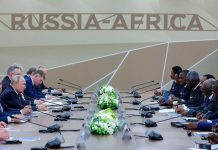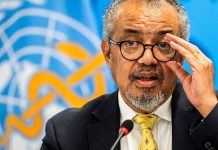Africa-Press – Mauritius. The Agence Française de Développement (AFD), in collaboration with the Ministry of Environment, Solid Waste Management and Climate Change, organised, today, a one-day multi-stakeholder workshop in the context of a mission to Mauritius from 21 August to 25 August 2023 so as to identify priority areas where further studies and support would be necessary to develop the country’s adaptation policy in relevant sectors.
The opening ceremony was held, this morning, at Eureka, in Moka, in the presence of the Minister of Environment, Solid Waste Management and Climate Change, Mr Kavydass Ramano.
The French Ambassador to Mauritius, Mr Frederic Bontems; the Deputy Director of the AFD, Mr Matthieu Thenaisie; and other personalities were also present on the occasion.
In his address, Minister Ramano recalled that the aim of the workshop was to hold consultations with partners from the public and private sectors and non-governmental organisations in order to launch Mauritius’s priorities in terms of adaptation to the impacts of climate change, within the framework of funding made available to Mauritius by the AFD.
He thus thanked the French government and the AFD for their long-standing support in a number of important projects such as the Mauritius Resilience Strategy project which was finalised during the first phase of the AdaptAction programme.
“This study recommended the promotion of ‘Nature-Based Solutions’ as planning and development tools to strengthen climate resilience and these types of recommendations and the data that emerged from the vulnerability assessments of six critical regions were very useful in drawing up the Land Drainage Master Plan 2022-2030,” Mr Ramano pointed out.
Furthermore, the Minister evoked that the Government had set out to make firm and ambitious commitments to both mitigation and adaptation, but due to the economic vulnerabilities, the country depended on the support of partners to help reach the targets set.
On this score, Mr Ramano underlined that the country was in an urgent and critical situation regarding the challenges posed by climate change as the climate indicators for Mauritius were all in the red.
“Temperatures in Mauritius have risen by an average of 1.39 degrees Celsius, while the sea levels have risen by an average of 4.7 mm per year, and we continue to experience extreme weather events such as flooding, droughts, and beach erosion,” he stated.
Minister Ramano thus emphasised that being very aware of the stakes, the Government was already investing enormously to strengthen the resilience and capacity to adapt.
“The question of access to climate financing, however, remains one of the greatest challenges for developing countries, particularly Small Island Developing States (SIDS) such as Mauritius,” he added.
On this score, Mr Ramano appealed to developed countries to keep their promises to provide the necessary financial resources to support developing countries in implementing adaptation projects as a matter of priority.
With regard to the 2023 United Nations Climate Change Conference (COP28) to be held in December 2023 in the United Arab Emirates, the Minister expressed hope that the issue of ‘loss and damage’ would be at the heart of discussions and that access to climate financing would be less restrictive for developing countries.
For his part, the French Ambassador indicated that the urgency prevailing as regards climate change called for a collective, coordinated, and resolute response in terms of adaptation.
“It is good to note that Mauritius has already started through multiplied initiatives aimed at mitigating the impacts of this phenomenon and strengthening the resilience of the population and the territory,” he stressed.
In addition, he lauded Mauritius’s active participation in international and multilateral initiatives, combined with its internal efforts, adding that it testified to its role as a regional leader.
“For its part, France is fully committed to working alongside the Republic of Mauritius to jointly respond to these extreme climatic phenomena, whose frequency and intensity are becoming more visible by the day, as well as to the unprecedented acceleration in biodiversity loss and environmental degradation,” Mr Bontems reiterated.
The Ambassador shared that the joint efforts of the Government and AFD testified to the shared commitment of France and Mauritius to strive, each according to its means and responsibilities, to reach the objectives of the Paris Agreement, adopted in 2015 and which still governed the respective actions of countries in terms of climate change mitigation and adaptation.
As for the Deputy Director of AFD, he remarked that AFD was one of the most active technical and financial contributors to the fight against the effects of climate change and to climate finance.
“Under the AdaptAction, more than 70 studies by some 500 experts have been conducted since 2017 in sectors such as governance and monitoring and evaluation systems, agriculture, nature-based solutions, and integrated water resource management, among others,” he added.
Regarding Mauritius, he underlined that three projects had been financed, including the updating of the contribution determined at the national level, a vulnerability study for six priority sites threatened by climate change, and a master plan for the Land Drainage Authority.
“We are therefore delighted that Mauritius has been chosen among the 12 partner countries to take part in phase 2 and benefits once again from this facility,” Mr Thenaisie pointed out. About AdaptAction The Republic of Mauritius is one of the beneficiary countries of the AdaptAction programme supported by the AFD.
The AdaptAction programme is a study and capacity-building tool designed to support countries particularly exposed to climate change in implementing their adaptation strategies and deploying resilient development trajectories.
Phase 1 of the project was launched in Mauritius from 2017 to 2022, and had helped to build stakeholders’ capacities, improve climate governance and further integrate adaptation into public policies.
Based on the achievements of the fruitful collaboration between AFD and the Mauritian government, the programme now needs to be extended into phase 2 in a bid to continue deploying adaptation strategies, and to support the implementation of projects to improve resilience in the face of climate change.
For More News And Analysis About Mauritius Follow Africa-Press







